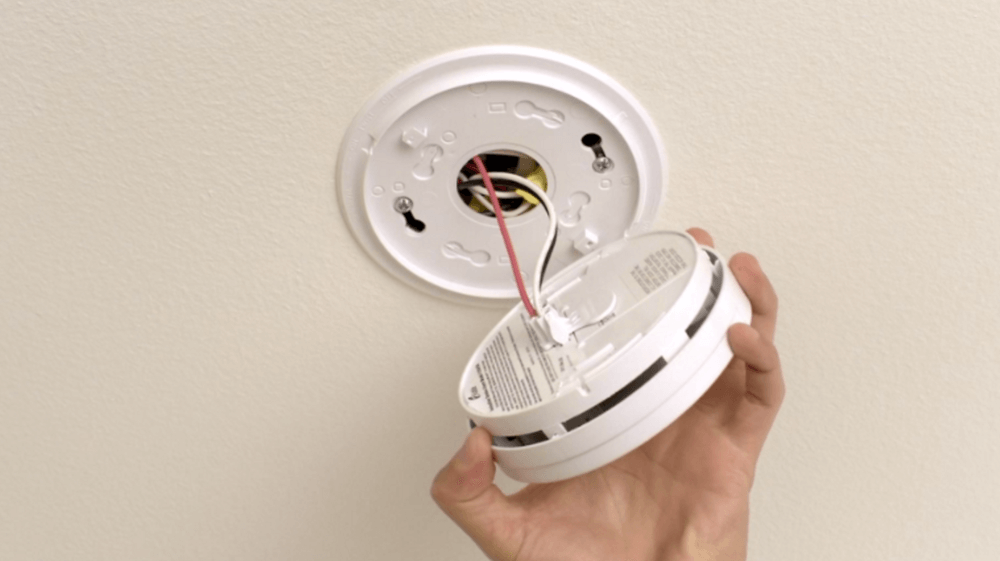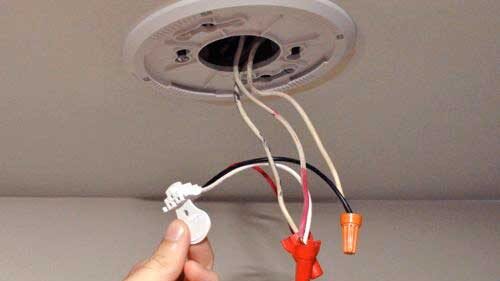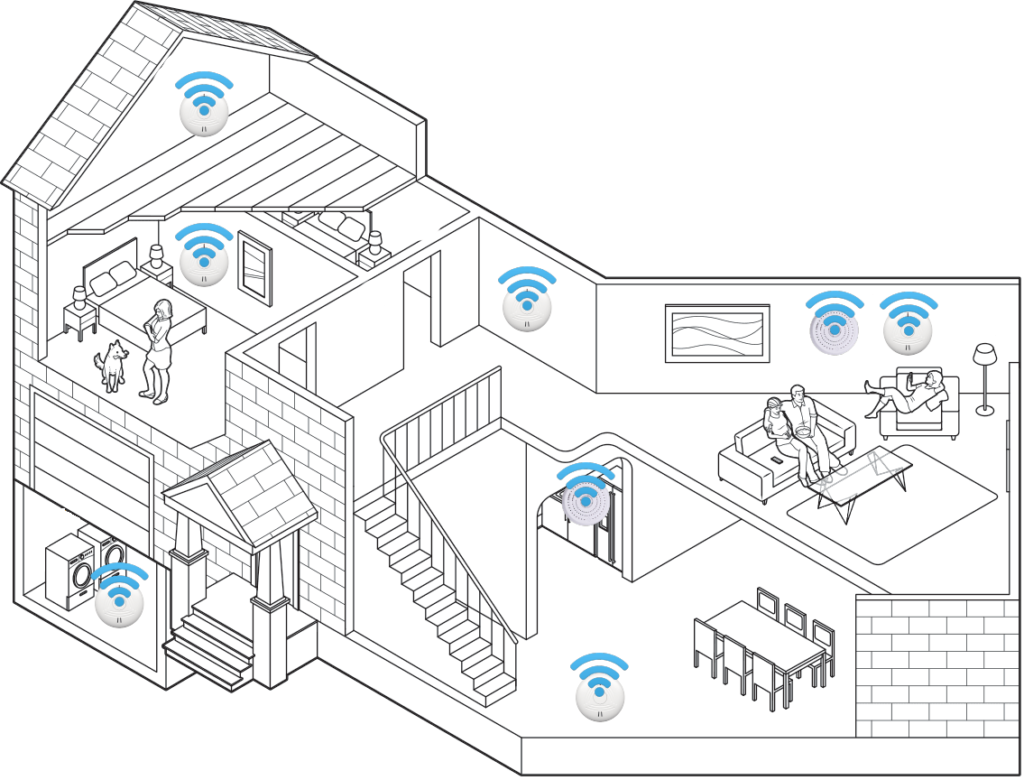
Interlinked smoke alarms are a great way to make sure your home is safe from fire. They provide you with more peace of mind because they let you know if there’s a problem in another area of the house, and give you time to get out.
This guide will explore the benefits and the differences of hard-wired and wireless fire detectors, and will show the best way to install them in your home. These types of alarms could be very expensive, so keep reading to discover which type of alarms best suits your property before you make your decision.
Interconnected Smoke Alarms - What's the connection?

Thanks to fire safety innovations, we now have the ability to install wireless interlinked smoke alarms. This is a great way for people who may be renting their property or don’t want to do any work in their home. But what are these types of alarms? What should you know before buying them?
Interlinked smoke detectors use radios and other technologies to detect fires while being connected throughout your home's system. They will alert you if a fire starts in another area, giving you time to evacuate the home. Once they sense an issue, all the alarms in your home go off together to facilitate the location of potential dangers in other areas. You can read our full article about what is an interlinked smoke alarm.
It is clear that having interlinked fire detectors provides a higher level of security and safety for homeowners. And while they might seem more expensive and difficult to install, there are ways to reduce the cost and save money on constant replacements and maintenance that the stand-alone units require.
The cost and ease of installation depend on the type of interlinked fire detector you want to fit in your home, whether hard-wired or wireless. You might be already familiar with these terms, but what does it mean?
Two Ways To Interlink Smoke Alarms: Hard-Wired vs Wireless
Hard-wired and wireless fire alarms have different benefits, but both are useful in providing you with peace of mind that your family is safe from fires. Before deciding on an interlinked smoke detector system for your home, it's important to understand the pros and cons of each option so you can make an informed decision about which one will work best for you.
First off, let's look at hard-wired detectors vs wireless ones because they are two very different types.
Interlinked Hard-Wired Smoke Alarms

In a hard-wired unit, all of the detectors are interconnected but have to be connected to the home's electrical system. This is similar to traditional fire alarms that plug directly into your wall and in turn, your home's electrical system.
A hard-wired interlinked alarm can run between £20 to £50 per device with an average of £400 installation fee. The benefit is that they are interconnected and can be programmed as a single unit, which means if one alarm goes off, they all do. However, if you have a big home, the installation fee might elevate the total cost of the whole system, alongside with the quantity of detectors you require.
Risks of having hard-wired alarms

While hard-wired smoke alarms could seem the best option, there are some risks that need to be considered first before fitting hard-wired detectors in your home. If you move and take the fire alarm with you, it may not be connected to your new home’s electrical system, so it won’t work. You would then have to replace it with a new hardwired alarm and have all of the devices connected again, which can be costly and time consuming.
Some brands come with a backup battery in case the fire starts within your electrical system. If this is the case, it will still go off and alert you of a fire. But having hardwired alarms that have backup batteries can be more expensive, and the maintenance must include both the wiring of the fire alarm system and the individual batteries.
Now, let's take a look at how interconnected wireless smoke detectors work.
Wireless interlinked smoke alarms

Interlinked wireless or radio-frequency linked smoke alarms work the same as the traditional ones, but without the hassle of hardwiring them. Once the detectors are interconnected and installed in your home, they will alert you if a fire starts in another area. The price range for wireless smoke alarms is slightly higher than hard-wired smoke alarms, and can go between £35 to £75 per unit.
On the other hand, since they are easier to fit, the installation fees are on average £200, which is cheaper than the mains-powered option. Still, if you have a big home, you might end up paying more for the wireless smoke alarms and installation.
So, how will these alarms benefit in short and long-term?
Risks Of Installing Wire-Free Smoke Alarms
While the Wireless interlinked smoke detectors seem to be more expensive than the hard-wired ones, there are several factors that should be considered.
First of all, installing wireless smoke alarms is much easier and quicker, therefore the fitting cost will be lower. Each alarm is equipped with radio frequency features which allow them to communicate together In addition, there is no need to re-decorate your walls and ceilings, as no extra wiring will be installed in your home. Discover how you can fit them yourself and save time and money.
When it comes to maintenance, wireless interlinked fire alarms require much less effort - there’s no need to change the batteries or have them checked over by an engineer. In most updated radio interlinked smoke detectors, the integrated battery will be sealed, tamper-proof and last for 10 years. In this way, you won't have to worry about changing the battery of your alarms for long time.
Finally, the wireless interlinked alarms are easy to relocate if you move home, where as hard-wired ones might not work correctly in a new electrical system.
Why Wireless Interlinked Smoke Alarms Are Better?
So, it's clear that a wireless interlinked system is better than a hard-wired one because it's easier to install and maintain, and they have a very wide range. They will also still go off if the fire starts inside your electrical system with a backup battery, which will unlikely happen with mains-powered alarms.
With the wireless alarms, you don't need to wire up anything extra in your home or replace a device if it depreciates in another location. In contrast, hard-wired devices require complex installation process and expensive equipment. If you ever decide to expand your fire alarm system, this will be clearly easier and cost-effective with battery powered units.
And finally, you can install interlinked battery powered alarms by yourself, saving the cost of paying a contractor for the labour. Check our guide on how to install interlinked battery operated alarms by yourself.
How to install wireless interconnected alarms in your home
Wireless interlinked smoke alarms are much more convenient than hardwired ones. There is no need to wire them up, and the installation cost is also much lower than wiring up a mains-powered fire alarm system or permanently installing hard-wired detectors.
If you decide to fit them yourself, you can follow our easy guide on how to do that within the premises of your home, and without calling any electrician. All you need to do is to turn the devices, pair them together and fit them to your ceiling. Click here to find our video instruction to facilitate the installation.
What other alarms are required?
Different areas of your home require different alarms, and smoke alarms alone are not enough to keep your home safe and avoid accidents to happen. For instance, your kitchen requires a heat alarm instead of a smoke alarm, and your attic requires a smoke alarm, while your bathroom doesn't require any. Read the below information to discover what areas should be covered and how many alarms are required.
Hallways and Landings
These are some of the most important areas where to fit smoke alarms as they allows people to escape quickly after a fire starts. The alarm will go off when smoke enters this area from another room in your property, and will allow you to prevent the fire from spreading, making this circulation space a safe zone.
Kitchen

Heat alarms detect excessive heat and not smoke particles, therefore are recommended to use in areas such as kitchen, where cooking fumes could trigger false alarms. If you also like to cook and your alarms goes always off, then you'd better take a look at our article at this link.
Alongside with heat protection, your kitchen should be also fitted with a carbon monoxide alarm (CO detector), which will warn you of the presence of this gas which is odourless and colourless, therefore extremely difficult to detect.
Carbon Monoxide Alarms are designed for detecting Carbon Monoxide and they It measures the levels of CO in parts per million (ppm) and alerts users by sound and/or indicator lights when it reaches dangerous levels.
Boiler room

If your gas boiler is located in a separate area, you should equip the room or the cupboard with an additional carbon monoxide alarm which will monitor the levels of CO gas. This is a requirement for every fuel burning appliance.
Living Room, Office Space, daily areas
Your daily areas where you spend most of your time should be protected with smoke alarms, in order for you to get notified of potential risks happening in your home as soon as they start. In case your living room has a fireplace, a carbon monoxide alarm should also be present in this area, to avoid intoxication from the excess of carbon monoxide that could be produced by the fuel burning appliance.
Bedrooms and Children's Room

In order to keep your children safe while they are sleeping, bedrooms should be fitted with smoke alarms as well. In addition, you as a parent can rest assured that the rooms in which your children sleep have sufficient protection all night long since the alarms will sound if there is a fire. Having an interlinked alarm system would get you alerted immediately if one of the rooms is at risk.
Attic
A smoke alarm should be installed in your attic as well, just like in every other room of your home. It will not only ensure your home is protected, but will also pinpoint the fire area if a fire occurs. Considering this is often the area where loads of electric wires run through, it's highly recommended to fit one smoke alarm in this area.
Indoors Garage
If you have an indoors garage, you need to fit a radio frequency interlinked heat alarm in the area. This will make sure that you are notified if a fire occurs anywhere within your home, and will sound the alarm in other areas of your property as well. At the same time, the heat alarm will only detect excessive heat, avoid the car fumes to trigger a smoke alarm.
Scottish Fire and Smoke Alarm Legislation 2022

If you are resident in Scotland, you should be aware that there are new regulations in place from February 2022 that will make some of the above practices a legal requirement.
Failure in meeting these regulations, could not allow full protection to your home and eventually break your insurance policy. Don't get burned, read our guide on the Scottish Fire and Smoke Alarm Legislation.
Who has legal duty to install adequate fire alarms?
In Scotland, it's property owner's responsibility to fit and maintain an operational fire alarm system. Everyone living at a residential address must be covered by an effective alarm system which complies with current regulations. But if you're renting rather than owning your property, your landlord is required by law to make sure all appliances comply with regulations.
If you are renting and you have not done it so, speak to your landlord and make sure the new standard is met, at no additional cost from your side. If not, start looking for a new place to rent before the rules come into force.
Is Your Home Fully Protected Yet?
Fire alarms are one of the most important features in your home. Ensuring that you have adequate smoke alarms, heat alarms and CO alarms fitted in your property is essential to protect yourself from the dangers that may lurk inside your own house.
It is also important that these detectors are interlinked together through radio frequency signals and have an integrated sealed battery, as the best and cost-effective solution that will save you money on the short and long-term.
If your house does not meet the required standards above, and you would like to install an adequate interlinked system that meets the new standards, you should have a look at our current offer by clicking here.









